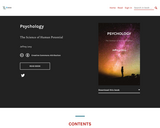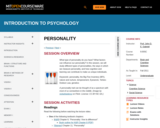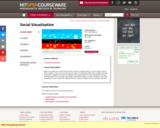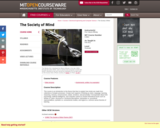
- Subject:
- Psychology
- Social and Behavioral Sciences
- Provider:
- Rice University
- Provider Set:
- OpenStax College



By the end of this section, you will be able to:Define personalityDescribe early theories about personality development

The first chapter provides an overview of the textbook and reviews the history of psychology and its methodology. Psychology is described as a science studying how hereditary (nature) and experiential (nurture) variables interact to influence the thoughts, feelings, and behavior of individuals. The remainder of the text will be organized in sections entitled “Mostly Nature” (Biological Psychology; Sensation & Perception; Motivation & Emotion), “Mostly Nurture” (Direct Learning; Indirect Learning (i.e., observational learning and language); Cognition), and “Nature/Nurture” (Human Development; Personality; Social Psychology; Maladaptive Behavior; Professional Psychology and Human Potential).

What type of personality do you have? What factors can influence our personality? In this session, we will study different types of personalities, the ways in which we measure personality, and how cognition and learning can contribute to make us unique individuals.

Supplementary work on individual or group basis. Registration subject to prior arrangement for subject matter and supervision by staff. From the course home page: Millions of people are on-line today and the number is rapidly growing - yet this virtual crowd is often invisible. In this course we will examine ways of visualizing people, their activities and their interactions. Students will study the cognitive and cultural basis for social visualization through readings drawn from sociology, psychology and interface design and they will explore new ways of depicting virtual crowds and mapping electronic spaces through a series of design exercises.

This course is an introduction to the theory that tries to explain how minds are made from collections of simpler processes. It treats such aspects of thinking as vision, language, learning, reasoning, memory, consciousness, ideals, emotions, and personality. It incorporates ideas from psychology, artificial intelligence, and computer science to resolve theoretical issues such as wholes vs. parts, structural vs. functional descriptions, declarative vs. procedural representations, symbolic vs. connectionist models, and logical vs. common-sense theories of learning.

Test Banks 1 out of 3 for (Stangor & Walinga text; MIT Open Courseware). Topics include: Introduction to Psychology, Science and Research of Psychology, Brain Structure, Brain Function, Methods of Brain Research, Vision, Consciousness, Attention, Memory, and Learning. Questions formats include multiple choice, short answer, fill in the blank, anatomical identification, short essay,

Test Banks 2 out of 3 for (Stangor & Walinga text; MIT Open Courseware). Topics include: Memory, Learning, Language, Thinking, Intelligence, and emotion and motivation. Questions formats include multiple choice, short answer, fill in the blank, anatomical identification, short essay,

Test Banks 3 out of 3 for (Stangor & Walinga text; MIT Open Courseware) Topics include: Personality, Child Development, Adult Development, Stress, Psychopathology, Social Psychology, Evolutionary Psychology, and Happiness. Questions formats include multiple choice, short answer, fill in the blank, anatomical identification, short essay,

An introduction to biological approaches to understanding the psychological construct of personality: Duration: 0:53.

A brief introduction to the role of culture in understanding the psychological concept of personality. Duration: 1:50.

An introduction to Sigmund Freud and his psychodynamic system applied to personality. Topics include consciousness, unconsciousness, id, ego, superego, conflict, defense mechanisms, psychosexual stages, Duration: 4:59.

A brief introduction to humanistic psychologists' approaches to understanding the construct of personality. Duration: 1:14.

A brief description of how the psychological schools of learning conceptualize the construct of personality. Duration: 2:07.

This video introduces the topics of interest to Neo-Freudians who believed in Freud's teachings, but that they relied less on sex: Alfred Adler, Erik Erikson, Karen Horney, and Carl Jung. Duration : 1:41.

A brief introduction to methods of evaluating one's personality. Duration: 1:39.

A brief introductory lesson on the relationship between stress and illness. Topics include psychophysiological disorders, disease prone personality characteristics, immune system, psychoneuroimmunology, stress hormones, healing, heart disease, personality, emotional states, asthma, tension headaches. Duration: 4:51.

A brief introduction to the tenets of trait theories of personality. Duration: 2:04.

A brief introduction to the psychological construct of personality. Topics include Hippocrates, Franz Gall, phrenology, axes of personality, Sigmund Freud, and neoFreudian views, Duration: 1:32.